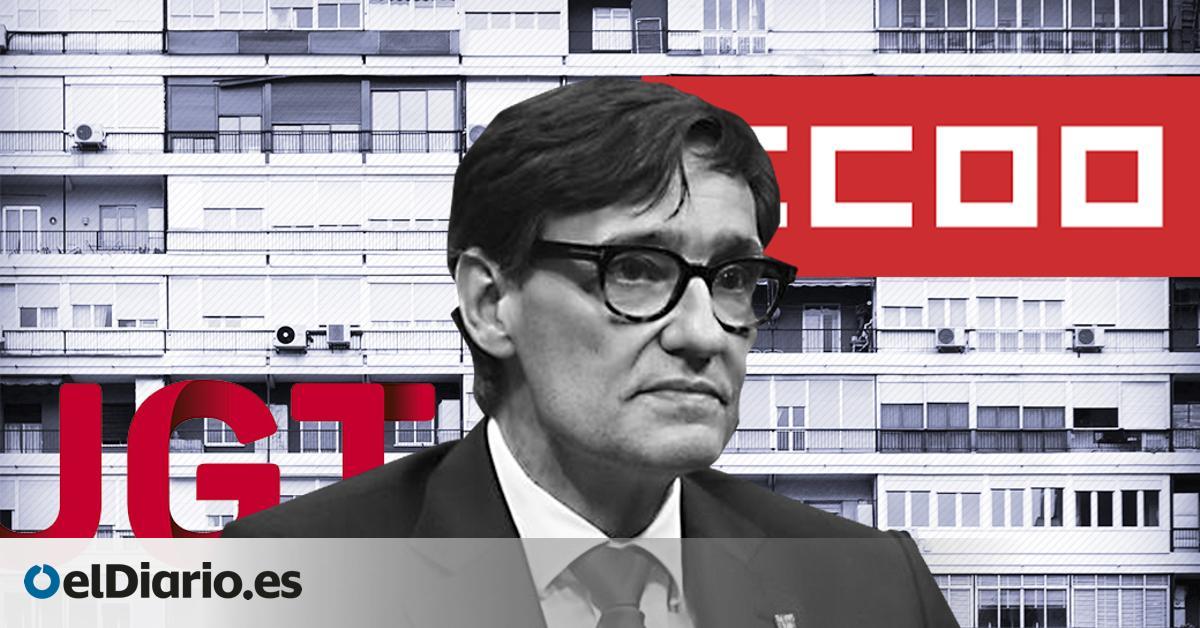
Salvador Illa is the embodiment of moderation. In his manner and in politics. And this has earned him the favour of a large part of the business and economic sector, while also raising hopes among the unions, who demand that he be “courageous” in defending public services. Other agents more closely linked to the third sector, however, have certain doubts and fear that some decisions taken due to his supposed transversality, such as the appointment of councillors linked to Convergència i Unió, could end up signifying a conservative turn in the Government.
Illa arrives at the Generalitat at a complex time, while the independence movement is rearming and reorganising, but also with good economic data that give him room to manoeuvre. In addition, all the agreements he has signed for his investiture are of a progressive orientation, with ERC and the Comuns. However, the business sector was practically unanimous in its desire for Illa to garner the necessary support to become president, both to end the procés and to avoid a repeat election.
This was made clear to him at the annual dinner organised by the influential Cercle d’Economia in May. Although the investiture was still a long way off and the pact with ERC and Comuns was not a reality, the majority of businessmen gave their blessing to Illa and wished him the best of luck.
After seven years of the independence process, they longed for “normality”. And the victory of the first non-separatist socialist for more than a decade has made personalities such as Jaume Guardiola, president of the Cercle d’Economia, see that normality could have arrived. This is also seen by the Cambra de Comerç and Pimec, which celebrates the “dejudicialisation of democratically agreed politics” and “normalisation”.
Now, the economic and business sector is calling on the new Government to provide calm and stability, which has not been the case in recent years – with legal and political ups and downs and repeated elections. And what is also an almost unanimous request is the development of a new financing model. “All infrastructures and social services are at their limit,” Guardiola said in an interview with elDiario.es shortly before Illa’s investiture.
The Cercle d’Economia calls on the Government to be “brave” and to commit to a progressive financing model. Other economic agents, such as Pimec and employers’ associations, have also openly positioned themselves in favour of a new fiscal paradigm.
But not everything is joyful in the business sector. Some entities such as Foment – despite being satisfied with the investiture – are wary of the consequences that the pacts that Illa has needed with ERC and Comuns to reach the presidency may have. Foment speaks of “concern” that “a political horizon of an interventionist nature that advocates the culture of degrowth” is being drawn up.
In this sense, the employers’ association finds it “disappointing” that, as a result of the investiture agreements, they want to stop the execution of the B-40, the Hard Rock macro-casino or that the airport expansion has been replaced by a “modernization” proposal.
But for other agents, the pacts with Comuns and ERC, instead of putting obstacles in the way, could fall short. While the employers’ associations ask for more tax reductions and the suspension of inheritance tax, unions such as CCOO and UGT demand to go further.
A reinforcement of the welfare state
The general secretary of CCOO in Catalonia, Javier Pacheco, congratulates Illa, but considers that the proposed fiscal policies “have not been sufficiently clear”. He regrets that, until there was an investiture agreement, “he did not make clear the decision to maintain the inheritance tax or his manifest intention to increase the IRPF brackets according to income”.
Pacheco calls for “more courageous policies” and the secretary general of UGT in Catalonia, Camil Ros, expresses the same opinion, asking the new president to exercise Catalan powers with “more decisive policies”. He insists on the need to draw up a roadmap to define the industrial future and a sustainable tourism model, while strengthening social and political dialogue to “resolve the conflict and improve the conditions of the working class”.
The two main unions agree that the new tax model is good news, as long as it strengthens the welfare state. “It should not serve to reduce taxes, but rather to generate more income to improve public health and education,” says Ros.
In this sense, both consider that another of the great challenges facing the Government is to tackle the housing crisis. “High prices are one of the great impediments for the working class to have a decent life,” says Ros. For his part, Pacheco also focuses on the need to deploy green policies and the urgency of continuing to develop measures against gender-based violence.
Concerns about access to housing are growing
Evolution of the percentage of Catalans who mention each of the following as the main problems in Catalonia
Source: Barometer CEO
Both are satisfied with the investiture, but CCOO has doubts about some decisions, such as appointing Miquel Sàmper as Minister of Business and Employment. The former Minister of the Interior in Torra’s Government has no clear connection with the economic or labour sector, so the appointment has caused “surprise” in Pacheco. “We did not expect that to be the bet. We will have to see what team he puts together and if he is going to be capable,” he points out.
Suspicions about some ministries
Sàmper’s appointment is not the only one that has raised suspicions. The announcement of Olga Pané as head of the Health portfolio has generated a wave of criticism on social networks following old videos in which she is seen demanding a reorganisation of doctors’ working hours to allow them to work more hours or stating that paediatricians are not necessary in Primary Care Centres – a claim that, on the other hand, is shared by some health entities.
One of the aspects of Pané that most worries the sector is that he comes from the private healthcare sector and the Metges de Catalunya union has already addressed the new minister, through a statement, warning her that “she should think about the system as a whole, always putting its public nature first and seeking the protection and well-being of its workers”.
The group wanted to highlight the need to increase the health budget “by around 3,000 million euros annually” to improve working conditions and guarantee good care for citizens and reduce, among other things, long waiting lists. Metges de Catalunya recognises Pané’s “long career” and urges him to continue with the transformation of the Catalan health model initiated during the ERC mandate, which also guaranteed spaces for participation for health workers.
Another announcement that has not gone down well is the creation of the ‘super-ministry’, which will be headed by Sílvia Paneque, who is in charge of Territory, Housing and Ecological Transition. It is true that the green entities are in favour of separating the environmental portfolio from the agricultural portfolio – which previously coexisted in the ministry of Climate Action, Food and Rural Agenda – because it appeals to sectors that often have contradictory interests.
But some, especially those linked to environmental conservation, fear that the fight against the climate crisis will be camouflaged among issues affecting housing, the transfer of Rodalies or the Government’s spokesperson, which is also in the hands of Paneque. Even so, some entities more focused on promoting decarbonisation see the glass half full and consider that this cocktail can help boost green energy, since the processing of wind and solar parks falls on Territory, something that previously delayed the procedures.
Another appointment that divides opinions is that of Esther Niubó as head of Education. She has experience in the sector and is known by the main teachers’ union, USTEC. Her spokesperson, Yolanda Segura, focuses on the tensions that may exist regarding language immersion. “She is very belligerent on this issue, and even asked for the application of the ruling of 25% of Spanish in schools,” laments the unionist.
Beyond the language, the teachers are clear about what they are asking Niubó for: more resources to end segregation and early school leaving and a clear commitment to public schools. They also hope to have a better relationship than with her predecessor, Anna Simó. During her tenure there was a record number of strikes in the sector and USTEC is asking for a reversal of some of the measures adopted by Simó, such as bringing forward the school calendar.
Another of the hot-button groups in this legislature – at least, at the beginning – are the Mossos d’Esquadra. The new minister, Núria Parlon, has the challenge of correcting the image of the force after Puigdemont’s flight. The Sindicat Autònom and the Sindicat de Mossos d’Esquadra regret the management of the previous minister, Joan Ignasi Elena, and hope that her successor does not see them “as an enemy”. And they ask, above all, that Parlon “be closer to the force” and not be guided “by her political agenda”.
However, social entities and agents are keeping an eye on this new Government, which – like all others – begins with challenges. But in this case Salvador Illa has the mandate to govern Catalonia in what has been conceived as a new stage after the procés, which leaves the national agenda aside for the first time in seven years.
Source: www.eldiario.es

